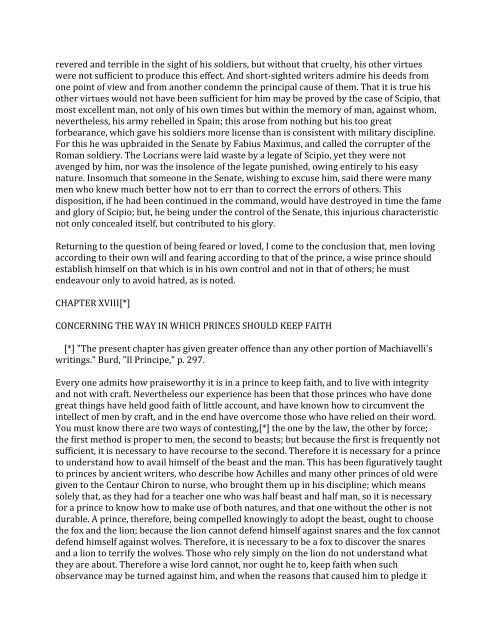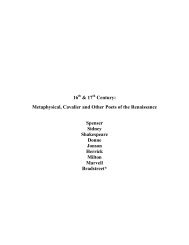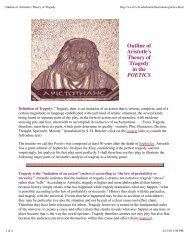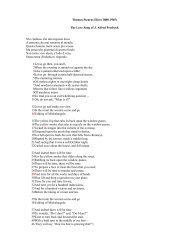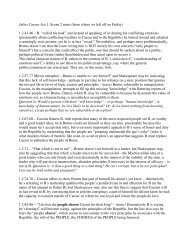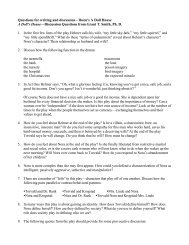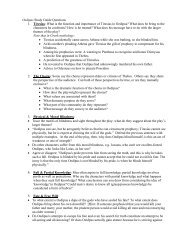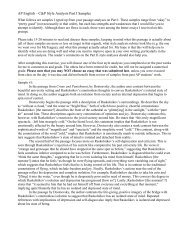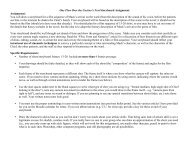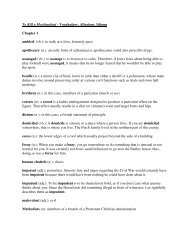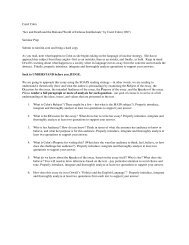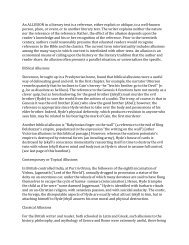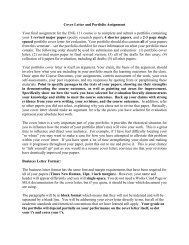The Qualities of the Prince Niccolo Machiavelli CHAPTER XIV THAT ...
The Qualities of the Prince Niccolo Machiavelli CHAPTER XIV THAT ...
The Qualities of the Prince Niccolo Machiavelli CHAPTER XIV THAT ...
You also want an ePaper? Increase the reach of your titles
YUMPU automatically turns print PDFs into web optimized ePapers that Google loves.
evered and terrible in <strong>the</strong> sight <strong>of</strong> his soldiers, but without that cruelty, his o<strong>the</strong>r virtueswere not sufficient to produce this effect. And short‐sighted writers admire his deeds fromone point <strong>of</strong> view and from ano<strong>the</strong>r condemn <strong>the</strong> principal cause <strong>of</strong> <strong>the</strong>m. That it is true hiso<strong>the</strong>r virtues would not have been sufficient for him may be proved by <strong>the</strong> case <strong>of</strong> Scipio, thatmost excellent man, not only <strong>of</strong> his own times but within <strong>the</strong> memory <strong>of</strong> man, against whom,never<strong>the</strong>less, his army rebelled in Spain; this arose from nothing but his too greatforbearance, which gave his soldiers more license than is consistent with military discipline.For this he was upbraided in <strong>the</strong> Senate by Fabius Maximus, and called <strong>the</strong> corrupter <strong>of</strong> <strong>the</strong>Roman soldiery. <strong>The</strong> Locrians were laid waste by a legate <strong>of</strong> Scipio, yet <strong>the</strong>y were notavenged by him, nor was <strong>the</strong> insolence <strong>of</strong> <strong>the</strong> legate punished, owing entirely to his easynature. Insomuch that someone in <strong>the</strong> Senate, wishing to excuse him, said <strong>the</strong>re were manymen who knew much better how not to err than to correct <strong>the</strong> errors <strong>of</strong> o<strong>the</strong>rs. Thisdisposition, if he had been continued in <strong>the</strong> command, would have destroyed in time <strong>the</strong> fameand glory <strong>of</strong> Scipio; but, he being under <strong>the</strong> control <strong>of</strong> <strong>the</strong> Senate, this injurious characteristicnot only concealed itself, but contributed to his glory.Returning to <strong>the</strong> question <strong>of</strong> being feared or loved, I come to <strong>the</strong> conclusion that, men lovingaccording to <strong>the</strong>ir own will and fearing according to that <strong>of</strong> <strong>the</strong> prince, a wise prince shouldestablish himself on that which is in his own control and not in that <strong>of</strong> o<strong>the</strong>rs; he mustendeavour only to avoid hatred, as is noted.<strong>CHAPTER</strong> XVIII[*]CONCERNING THE WAY IN WHICH PRINCES SHOULD KEEP FAITH[*] "<strong>The</strong> present chapter has given greater <strong>of</strong>fence than any o<strong>the</strong>r portion <strong>of</strong> <strong>Machiavelli</strong>'swritings." Burd, "Il Principe," p. 297.Every one admits how praiseworthy it is in a prince to keep faith, and to live with integrityand not with craft. Never<strong>the</strong>less our experience has been that those princes who have donegreat things have held good faith <strong>of</strong> little account, and have known how to circumvent <strong>the</strong>intellect <strong>of</strong> men by craft, and in <strong>the</strong> end have overcome those who have relied on <strong>the</strong>ir word.You must know <strong>the</strong>re are two ways <strong>of</strong> contesting,[*] <strong>the</strong> one by <strong>the</strong> law, <strong>the</strong> o<strong>the</strong>r by force;<strong>the</strong> first method is proper to men, <strong>the</strong> second to beasts; but because <strong>the</strong> first is frequently notsufficient, it is necessary to have recourse to <strong>the</strong> second. <strong>The</strong>refore it is necessary for a princeto understand how to avail himself <strong>of</strong> <strong>the</strong> beast and <strong>the</strong> man. This has been figuratively taughtto princes by ancient writers, who describe how Achilles and many o<strong>the</strong>r princes <strong>of</strong> old weregiven to <strong>the</strong> Centaur Chiron to nurse, who brought <strong>the</strong>m up in his discipline; which meanssolely that, as <strong>the</strong>y had for a teacher one who was half beast and half man, so it is necessaryfor a prince to know how to make use <strong>of</strong> both natures, and that one without <strong>the</strong> o<strong>the</strong>r is notdurable. A prince, <strong>the</strong>refore, being compelled knowingly to adopt <strong>the</strong> beast, ought to choose<strong>the</strong> fox and <strong>the</strong> lion; because <strong>the</strong> lion cannot defend himself against snares and <strong>the</strong> fox cannotdefend himself against wolves. <strong>The</strong>refore, it is necessary to be a fox to discover <strong>the</strong> snaresand a lion to terrify <strong>the</strong> wolves. Those who rely simply on <strong>the</strong> lion do not understand what<strong>the</strong>y are about. <strong>The</strong>refore a wise lord cannot, nor ought he to, keep faith when suchobservance may be turned against him, and when <strong>the</strong> reasons that caused him to pledge it


